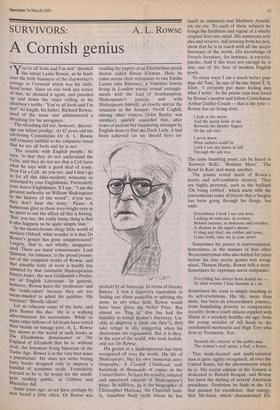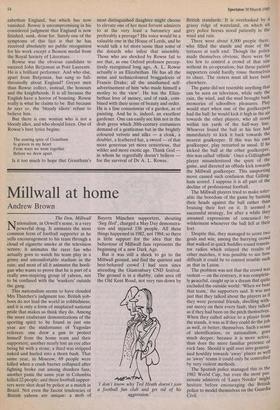A Cornish genius
Vou're all fools and I'm not!' shouted .1. the infant Leslie Rowse, as he leant over the little banisters of the clayworker's cottage in Cornwall which was his child- hood home. Since no one took any notice of him, he shouted it again, and paraded U p and down the stairs trilling in his Choirboy's treble: 'You're all fools and I'm not!' At length, his father, Richard Rowse, tired of the noise and administered a thrashing for his arrogance. The thrashing did not, however, discour- age our infant prodigy. At 82 years old the cat-loving Cornishman Dr A. L. Rowse Still remains faithful to his solipsistic creed that we are all fools and he is not.
The trouble with English people,' he says, 'is that they do not understand the Celts, and they do not see that a Celt laces What he says with a good deal of irony. Now I'm a Celt, do you see, and I don't go in for all this false-modesty nonsense so esteemed by your Englishman. Particularly Your hetero Englishman. If! say, "I am the greatest authority on William Shakespeare in the history of the world", d'you see, they don't hear the irony.' Pause. A humorous glint in those ever-bright eyes as he peers to see the effect all this is having. 'But, you see, the really funny thing is that it also happens to be quite simply true.' In the monochrome dingy little world of modern Oxford, what wonder is it that Dr Rowse's genius has gone unappreciated? Largely, that is, not wholly, unappreci- ated. There are many connoisseurs. Lord Quinton, for instance, is the proud posses- sor of the complete works of Rowse, and that sizeable body of work is hardly less admired by that estimable Shakespearian Emrys Jones, the new Goldsmith's Profes- sor of English Literature. In general, however, Rowse hates the 'professors' and the 'tenth-raters' because they are too mean-minded to admit his qualities. His reaction? 'Bloody idiots!' Let us rehearse some of the facts, and give Rowse his due. He is a walking advertisement for teetotalism. While so many other fellows of All Souls have rotted their brains on vintage port, A. L. Rowse has shown to the world in such books as The Elizabethan Renaissance or The England of Elizabeth that he is, without rival, the foremost living historian of the Tudor Age. Rowse is in the very best sense a populariser. He does not write boring fusty books designed only to impress a handful of academic rivals. Formidably learned as he is, he writes for the intelli- gent reading public, as Gibbon and Macaulay did. Some years ago, as we have perhaps by now heard a little often, Dr Rowse was reading the papers of an Elizabethan quack doctor called Simon Forman. Here he came across clear references to one Emilia Lanier (née Bassano), a Venetian Jewess living in London whose sexual entangle- ments with the Earl of Southampton, Shakespeare's patron, and with Shakespeare himself, so exactly mirror the situation in the Sonnets. Nevill Coghill, among other experts (John Bayley was another), quickly conceded that, after years of patient but blundering attempts by English dons to find the Dark Lady, it had been achieved (as we should have ex- pected) by an historian. In terms of literary history, it was a discovery equivalent to finding out about penicillin or splitting the atom. In any other field, Rowse would have been given the Nobel Prize. But almost no 'Eng fie don has had the humility to accept Rowse's discovery. Un- able to disprove it (how can they?), they take refuge in silly sniggering when his discoveries are expounded. But it is they, in the eyes of the world, who look foolish, and not Dr Rowse.
His genius as a Shakespearian has been recognised all over the world. His life of Shakespeare, like his own immortal auto- biography, A Cornish Childhood, sold hundreds of thousands of copies in the United States. So have his sensibly adapted and annotated editions of Shakespeare's plays. In addition, he is the biographer of Christopher Marlowe, the Churchill fami- ly, Jonathan Swift (with whom he has much in common) and Matthew Arnold, etc etc etc. To each of these subjects he brings the freshness and vigour of a wholly original first-rate mind. His numerous arti- cles and reviews, still pouring from his pen, show that he is in touch with all the major literature of the world. His knowledge of French literature, for instance, is encyclo- paedic. And if this were not enough he is also one of the best of modern English poets.
'In many ways I am a much better poet than old Tom,' he says of his late friend T. S. Eliot. 'I certainly put more feeling into what I write.' In the poetic vein best loved by Rowse's mentor and fellow-Cornishman Arthur Quiller-Couch — that is the lyric — Rowse has no living rival.
I look at the moon And the moon looks at me Between the slender fingers Of the ash tree.
I never knew What sadness could be Until I saw the moon in full Through the ash tree.
The same haunting music can be heard in 'Kenwyn Bells', 'Bodmin Moor', 'The Road to Ken' and many another.
The poems reveal much of Rowse's lonely and self-confident mystery. They are highly personal, such as the brilliant 'On being robbed', which starts with the conventional sense of frisson that a burglar has been going through his things, but ends: Everywhere I look I see you here, Lurking on staircase, in corners, Behind curtains, in bedroom and corridor, A shadow in the night's alarms. 0 thug and thief, my robber and lover, Come forth, take me in your arms!
Sometimes his poetry is conversational. Sometimes, in the manner of that other Westcountryman who also waited for years before his true poetic genius was recog- nised, Thomas Hardy, Rowse tells a story. Sometimes he expresses saeva indignatio: Everything has always been denied me — So what wonder I hate humans as I do.
Sometimes his verse is simply touching in its self-revelations. His life, more than most, has been an extraordinary journey, from humilating poverty to comparative security; from a youth almost crippled with illness to a serenely healthy old age; from the young socialist of All Souls to the unashamed meritocrat and High Tory who lives at Trenarren. Yet:
Beneath the exterior of the public man The woman's soul opens, a bud, a flower.
This multi-faceted and multi-talented man is quite rightly recognised, all over the United States, for the phenomenon which he is. His recent edition of the Sonnets is dedicated to Ronald Reagan, and Rowse has been the darling of several American presidents. Doubtless he finds in the US that passion for excellence, that energy, that life-force which characterised Eli- zabethan England, but which has now vanished. Rowse is uncompromising in his considered judgment that England is now finished, sunk, done for. Surely one of the symptoms of this fact is that he has received absolutely no public recognition for his work except a Benson medal from the Royal Society of Literature.
Rowse was the obvious candidate to succeed John Betjeman as Poet Laureate. He is a brilliant performer. And who else, apart from Betjeman, has sung so full- throatedly about England? Greyer men than Rowse collect, instead, the honours and the knighthoods. It is all because the English have a horror of boasting. Rowse really is what he claims to be. But because he says so, the 'bloody idiots' refuse to believe him.
But there is one woman who is not a bloody idiot, and who should listen. One of Rowse's best lyrics begins: The soaring spire of Grantham Is graven in my heart
From ways we went together Before we drew apart.
Is it too much to hope that Grantham's most distinguished daughter might choose to elevate one of her most fervent admirers to at the very least a baronetcy and preferably a peerage? His voice would be a valuable one in the House of Lords, and he would talk a lot more sense than some of the dotards who infest that assembly. Those who are shocked by Rowse fail to see that, as one Oxford professor percep- tively recognised long ago, A. L. Rowse actually is an Elizabethan. He has all the noise and technicoloured braggadocio of Francis Drake; all the unashamed self- advertisement of him 'who made himself a motley to the view'. He has the Eliza- bethan love of money, and of rank, com- bined with their sense of beauty and order. He is a fine connoisseur of a garden, as of painting. And he is, indeed, an excellent gardener. One can easily see him not in the drab greys which 20th-century costumiers demand of a gentleman but in the brightly coloured velvets and silks — a cloak, a doublet, a feathered hat, a sword — of that more generous yet more censorious, that wilder and more exotic age. Thank God — in whom he regretfully doesn't believe — for the survival of Dr A. L. Rowse.















































 Previous page
Previous page